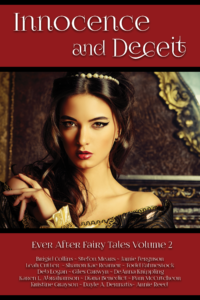“Like Wind Over Water” is in Innocence and Deceit, the second volume in the Ever After Fairy Tales anthology series.
Enter the magical, unpredictable, wonderful world of fairy tales!
Meet Karen L. Abrahamson!
Karen writes urban fantasy, mystery, historical fiction, romantic suspense, paranormal romance, and whatever else suits her fancy. She and her various author personalities reside on the west coast of Canada where eagles, killer whales, and two cats keep her company.
“Like Wind Over Water”
Romy left her mermaid form to search for her beloved. Five years later, on a ship heading up the Canadian coast, she finally finds him—and learns his secret.
Excerpt
Ahead, the man aboard the sailboat waved his arms and yelled as if waving his arms could wave them away. The Borealis Queen churned closer. Closer until Romy swore she could look down into the surely-soon-to-be-dead man’s eyes.
Blue, she realized. The color of light through tropical waves. Once upon a time she’d known a man with such color eyes. He’d carried the scent of land and grass fields. She had met him on a rocky shore and in that distant time she thought she might have fallen in what the humans called love. But her man had returned to the land and she couldn’t bear losing the sea.
She had never seen him again even though longing had led to her trading away her tail soon after in hopes of finding him again. All she’d known was that he liked to walk by the sea and that he lived in a place called the Sunshine Coast of British Columbia. Not much to go on.
Or maybe it was.
—from “Like Wind Over Water” by Karen L. Abrahamson
The Interview
What inspired you to write this beautiful story about a mermaid searching for her lost love?
Once upon a time, when I was far younger, I worked on the BC Ferries. A few years ago, the ferry that I once worked on sank under suspicious circumstances with two people lost. The story really affected me and I kept thinking about it. Then the idea of a mermaid working as a crewman on a ferry occurred to me. I asked why would she be working there and the story fell into place. As for the lost love, well, I’m sure that we’ve all had one or two of those…
You once worked on passenger ferries. Did that experience help shape the ship the Borealis Queen, which is the setting for most of “Like Wind Over Water?
It certainly did, both in terms of the ship structure and in terms of people’s attitudes. The ferry that I worked on was an anomaly amongst the ferry fleet because it had passenger cabins below the car decks. I gave the Borealis Queen lower deck cabins, too, but otherwise she was an imaginary ship. My experiences on the ferries also helped shape the story in terms of the relationships and resentments between male and female crew. At the time I worked the ferries, there were no female crew other than in the catering department. Female deck crew just wasn’t happening. Of course all that has changed now, but my experience, and the challenge of being the first female in previously male job colored this story.
What difference do you see between today’s fairy retellings, and the types of fairy tales that were told hundreds of years ago?
The original fairy tales were quite gruesome and clearly cautionary tales for children and society in terms of expected behavior. That changed through the Victorian era and afterwards when society began to shelter children and created adolescence (previously children went from childhood to adulthood without the prolonged teenage years we see today.) I think today’s fairy tale retellings are still somewhat caught in the Victorian era insofar as we don’t see truly gruesome episodes in children’s tales. On the other hand, fairy tale retellings for adolescents often recapture that original gruesome nature.
The original fairy tales were often cautionary tales, told to teach lessons. Do you find some of these lessons still apply in today’s world?
Interesting question. I think fairy tales are often like layers of onions. There are the overt lessons that are easy to spot and they may or may not be relevant to today, but when you dig a little deeper into a lot of tales you find lessons that apply to today’s world. As a result I find I use fairy tales in some unusual places in my writing. For example, I’m currently writing a series of mystery novels set in an alternate history Russia where Russian fairy stories provide an explicit overarching theme/structure to each story as you peel the layers of meaning away.
You’ve written a number of stories set in Burma. Have you incorporated Burmese folk tales/mythology in any of them? And if so, what have you found the most fun to write about?
Yes and yes. I write about Burma and I have used Burmese folk tales and animistic beliefs, which aren’t quite fairy stories, but close relations. I absolutely love the Burmese nats, which are the spirits of the land and also the spirits of dead heroes/someone notable. Nats can be the spirit of a tree or a hill, or they can be the butterfly spirit of a wronged woman or a hero wrongfully killed. They can be out for revenge or they can support you, depending on how you treat them. Treat a nat with respect, such as making offerings to it, and things will likely go well for your family and home, but fail to make offerings and all bets are off. They can cause a hellish amount of misfortune and mischief. Think big time gremlins, because these guys can bring down whole kingdoms. I’ve used nats, including the Burmese nat-inhabited puppets in my Aung and Yamin fantasy/mysteries and they’ve also played a large role in my Romantic Suspense novel, Shades of Moonlight.
I seriously love nats…
You now live on the west coast of Canada, and often incorporate that setting into your stories. What is it about that part of the world that you find so appealing?
OMG. What’s not to like? This is a part of the world that can get into your blood. There’s ocean and mountains and forests and killer whales and bears and… Need I go on? It’s a beautiful part of the world, but it’s also mysterious with so much land and a relatively low population. As a result, it provides a gorgeous, if sometimes unsettlingly lonely setting. Where I’m currently living is a lovely resort area that brings many escapees from urban life from all over the world and that brings conflict. So does the growth of the entire west coast population. The development to accommodate more people isn’t being done well and we’re losing a lot of the things I love most about the coast. As a result I can harness my frustration and anger and channel it into my writing. At the moment, though, I guess I can say that where I live provides me with a peace that I haven’t found elsewhere.
Tell us about your cats!
Monsters! Monsters, I say! They just wear svelte kitty fur and purr to lure you in and get you to love them and then you’re trapped and at their mercy.
Seriously, I have two wonderful Bengal cats that I love dearly. They keep me entertained and tearing my hair out, at the same time. At eleven, almost twelve-years-old, most cats have settled down, but not these two. They demand walks (on a leash) and regular attention and if they don’t get it when they want it they will do bad things.
I won’t say anymore. They are listening.
What story (or stories) are you working on now, and what’s fun about what you’re writing?
At the moment mysteries seem to be my life. I’m working on the final stages of publishing the fourth in my Detektiv Kazakov mysteries, which should be out in June.

These are the books with the Russian fairy tales in them. I’ve just started a new mystery in my Phoebe Clay mystery series (this will be the second). This book is set in India instead of coastal British Columbia. Phoebe is a former school teacher struggling with PTSD due to a school shooting. She was the hero in Through Dark Water and now she and her sister and niece are on a tour in India when things go awry. So far I don’t THINK there’ll be fairies…
I recently returned from a trip to India that provides fuel to this novel-in-progress. So that’s part of what’s fun about writing—it can be cathartic and, at least in mysteries—you can maim the people that make you angry. I love the creative process and mining the areas of my life that struck strong emotional chords. It’s way better, and safer than actually doing nasty deeds.
It’s fun writing about made-up people that, through writing, you begin to know so intimately. Series characters really lend themselves to this. I also enjoy the challenge and the risk of developing the characters I don’t like so that they become heroes (at least in their own minds). Heck, I can even find myself liking some villains in my stories!
Thanks for the opportunity to do this, Jamie! It was really fun to have to ponder the answers to your insightful questions.
About Karen
Karen L. Abrahamson is a well-traveled writer who has explored cultures and countries around the world but British Columbia, Canada is her favorite place to come back to. She is the author of literary, mystery, romance and fantasy fiction including the highly regarded Cartographer fantasy series. She lives on the west coast of Canada with two Bengal cats that aren’t quite as well traveled as she is.
When she isn’t writing she can be found with a camera and backpack in fabulous locations around the world.
Find Karen
Website ~ Facebook ~ BookBub ~ Amazon ~ Goodreads
Find Innocence and Deceit!
Amazon ~ Barnes & Noble ~ Kobo ~ Apple Books ~ Books2Read ~ Goodreads


Sign up for the Blackbird Publishing newsletter!

